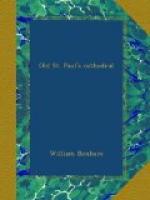“England, Netherlands, the Heavens
and the Arts,
The Soldiers, and the World, have made
six parts
Of noble Sidney; for none will suppose
That a small heap of stones can Sidney
enclose.
His body hath England, for she it bred,
Netherlands his blood, in her defence
shed,
The Heavens have his soul, the Arts have
his fame,
All soldiers the grief, the World his
good name.”
Close to this, on the same pillar, was a tablet to SIR THOMAS BASKERVILLE, who had also done good service as a brave soldier, according to the account given in fourteen lines of verse, which, it must be said, are a great deal more musical than Sidney’s.
SIR CHRISTOPHER HATTON (1540-1591) had a finer monument than any of the other Elizabethan celebrities. Whether he deserved it is another matter. He was clever and handsome, and got into special favour with the Queen by his graceful dancing. He even wrote her amorous letters. The part he took in procuring the condemnation of the Queen of Scots is well known.
At the extreme end of St. Dunstan’s Chapel we come to another Mediaeval worthy.
HENRY DE LACY, EARL OF LINCOLN (1249-1311), “the closest councillor of Edward I.” (Bishop Stubbs), was somewhat doubtful in his loyalty to Edward II., being divided between his grateful memory of the father and his disgust at the conduct of the son. His house was on the site of Lincoln’s Inn, which owes its name to him. He was a munificent contributor to the “new work” of St. Paul’s, and was buried in St. Dunstan’s Chapel, on the south side of the Lady Chapel.
[Footnote 1: “Here lieth Sebba, King of the East Saxons, who was converted to the faith by Erkenwald, Bishop of London, in the year of Christ 677. A man much devoted to God, greatly occupied in religious acts, frequent prayers, and pious fruits of almsgiving, preferring a private and monastic life to all the riches and honours of the kingdom, who, when he had reigned 30 years, received the religious habit at the hands of Walther, Bishop of London, who succeeded the aforesaid Erkenwald, of whom the Venerable Bede makes mention in his History of the English People.”]
[Footnote 2: “Here lieth Ethelred, King of the English, son of King Edgar, to whom, on the day of his hallowing, St. Dunstan, the archbishop, after placing the crown upon him, is said to have foretold terrible things in these words: Forasmuch as thou hast aspired to the Kingdom through the death of thy brother, against whom the English have conspired along with thy wretched mother, the sword shall not depart from thy house, raging against thee all the days of thy life, destroying thy seed until the day when thy Kingdom shall be conveyed to another Kingdom whose customs and language the race over whom thou rulest knoweth not; nor shall there be expiation save by long-continued penalty of the sin of thyself, of thy mother, and of those men who took part in that shameful deed. Which things came to pass even as that holy man foretold; for Ethelred being worn out and put to flight in many battles by Sweyn, King of the Danes, and his son Cnut, and at last, closely besieged in London, died miserably in the year of the Incarnation 1017, after a reign of 36 years of great tribulation.”]




